Jeremy Corbyn re-elected: What next for Labour?
- Published
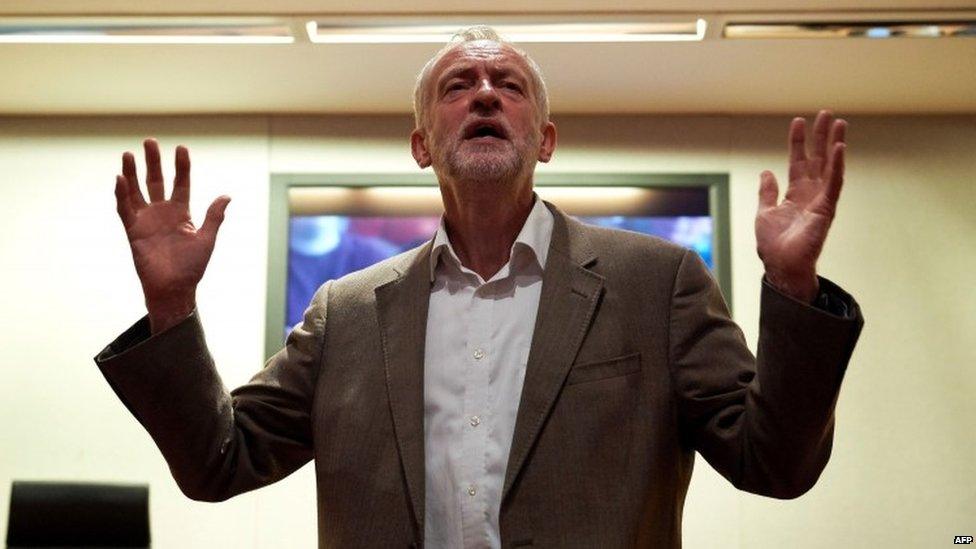
Will Jeremy Corbyn use his victory as a mandate for sweeping change?
So Jeremy Corbyn has been re-elected as Labour's leader with a larger mandate than a year ago.
There was plenty of talk from the leader and his supporters ahead of the result of "coming together" after a second bruising campaign.
He even provided proof on BBC TV that he was growing a diminutive olive tree outside his office - the presumed purpose of which is to break off a branch and proffer it to his internal opponents.
But some of the MPs who voted for a motion of no confidence in him believe that those around the leader will only sue for peace on their terms.
Jeremy Corbyn - with a strong interest in the politics of the Middle East - will be familiar with the speech of the late PLO leader Yasser Arafaf to the UN general assembly in 1974 when he said he came bearing an olive branch in one hand and a freedom fighter's gun in the other.
Arafat beseeched the UN "don't let the olive branch fall from my hand".
Party loyalty
One former frontbencher welcomed Jeremy Corbyn's pledge to "wipe the slate clean" following his re-election but said that if he continued to criticise the leadership then he fully expected them to "unleash the dogs of war".
And he is not the only one expecting to be mauled.
He believes Momentum - the group set up by veteran leftwinger Jon Lansman - is likely to pursue a strategy of deselection of anti-Corbyn MPs.
"Jeremy will stay above it all, of course, adopting his 'see no evil' approach. He will say it's just a matter of local Labour parties taking individual democratic decisions. The boundary changes will unlock the whole process."
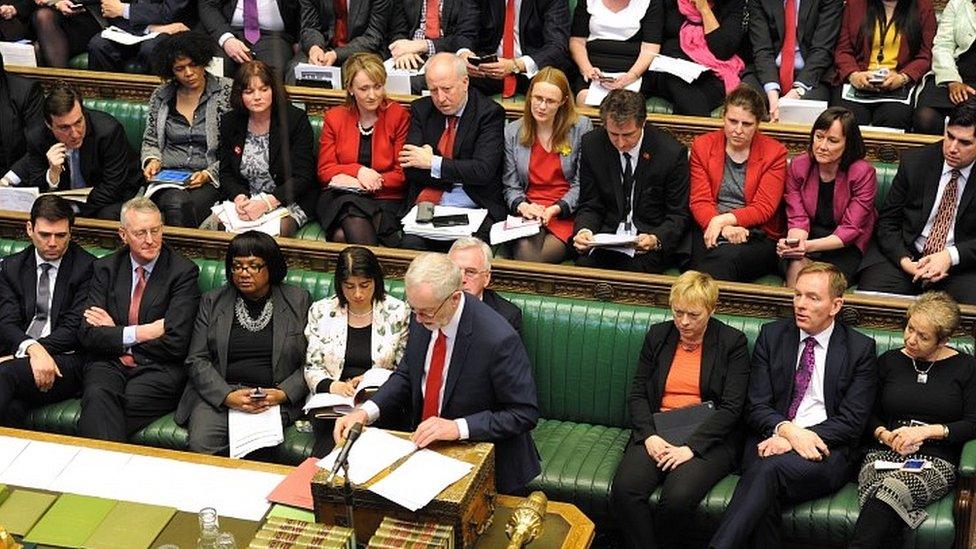
The make-up of Jeremy Corbyn's frontbench is likely to be one of many battles ahead
Of course, motivated by loyalty to their party - or in some cases by personal ambition - some of the 172 MPs who voted for no confidence in Jeremy Corbyn at the start of the summer will - as the sun sets on Owen Smith's challenge - sue for peace and signal their willingness to serve on the frontbench.
But just how many will do so depends on what decision Labour's ruling national executive comes to on holding elections to the shadow cabinet - discussions were set to resume within hours of the leadership election result.
If MPs were to be permitted to elect most of the members of the top team rather than the leader choosing the whole lot, then some who are still sceptical of Jeremy Corbyn's leadership could return - arguing they are putting party before personalities, and are answerable to their parliamentary peers.
If Jeremy Corbyn doesn't go along with this and allows instead the increasingly left-wing membership to choose many of his frontbenchers, then he might find it difficult to put together a broad-based team.
But I have been told that some who have been vocally critical of their leader would return even if appointed rather than via shadow cabinet elections. However some want more freedom to question their leader and guarantees they won't be deselected.
Informal soundings have taken place and if a concordat is reached, this may be enough to ensure there is a functioning shadow cabinet. But some of the more junior shadow roles may remain unoccupied.
Corbyn cushion
It is a measure of how deep divisions run in Labour that one MP denounced colleagues considering a return to the front rank as "collaborators".
As for the other Corbyn-sceptics, they are likely to fall in to three broad - and not mutually exclusive - categories.
One group are worried about what is being termed the "Corbyn cushion". Although Labour's record in local government by-elections suggest that the party is holding on to most of its seats, there have been ten losses since May - and three of the most recent to the Lib Dems.
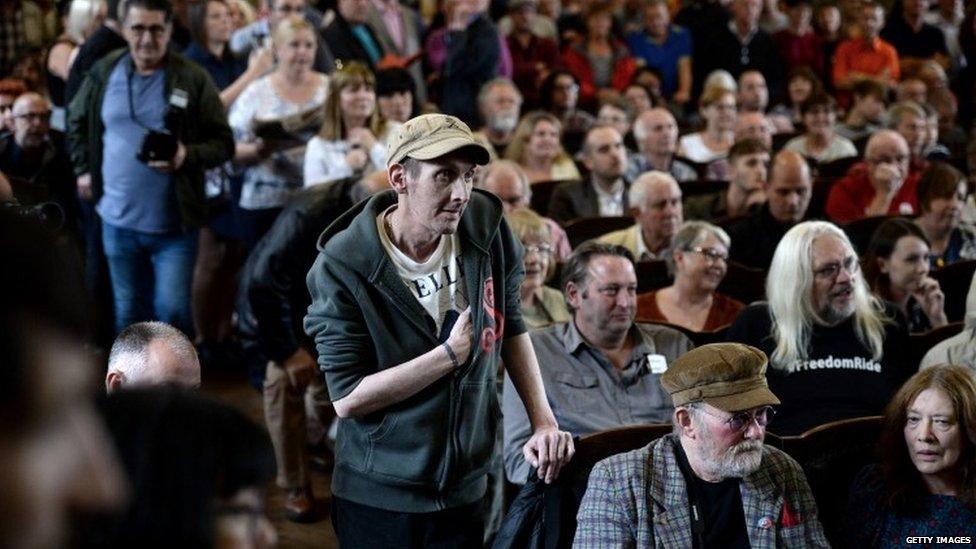
Will party members and supporters get a direct say in who sits at Labour's top table?
This, along with Labour's deficit in the national polls, has lead some MPs to believe that only big majorities will cushion them for what they believe will be Corbyn's continued unpopularity.
So those with marginal seats will spend more time there than at Westminster and certainly won't take on the distraction of a front bench job.
"It's not like it would lead to a ministerial job anyway so what's the point," one confided - and those fearing deselection will also be spending more time in their constituencies.
Then there is a group who are already thinking about standing down, or expect to be defeated and will be putting out feelers for a post-politics career.
Internal opposition
But there are also those who are bloody minded and will stay and openly fight Jeremy Corbyn. One of them said "we will be just like the Campaign group" - the left-wing faction to which Jeremy Corbyn belonged under Tony Blair - slagging off the leader.
"But as I won't vote with the Tories, I think I will be hard pressed to be able to rebel against my own party the hundreds of times that Jeremy Corbyn did," they said.
Some in this group have even been subtly sounded out as to whether they would continue to take the Labour whip in the event of Jeremy Corbyn's re-election.
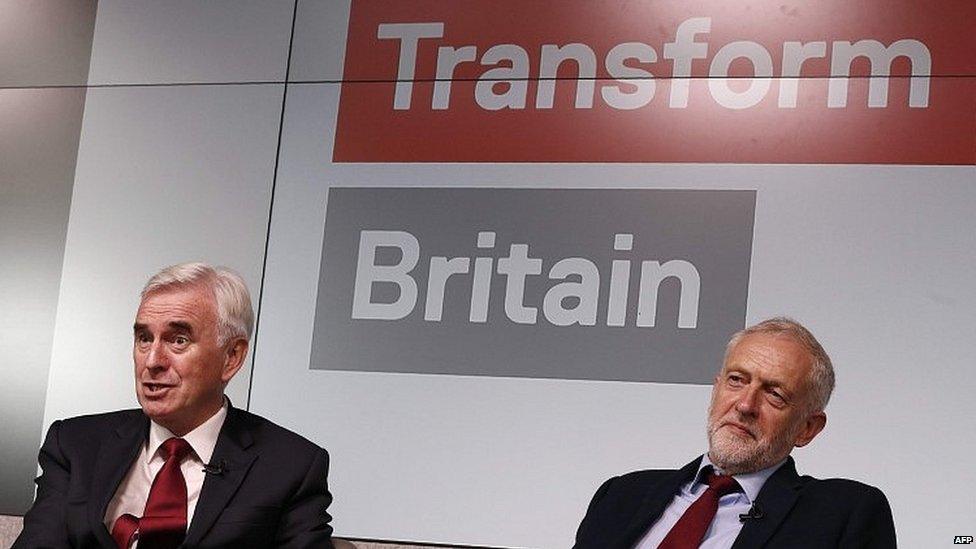
Corbynistas want the leader and his allies to ram home their anti-austerity message
The answer, so far, is yes because while tensions in Labour will stretch unity to the verge of breaking point the party - for now at least - is unlikely to split.
Both sides see that as mutually assured destruction and even Labour MPs who - unlike the leader - back Trident, aren't ready to press the nuclear button when it comes to their own party.
The former frontbencher Chris Bryant set out at length on Facebook why he wouldn't return to the shadow cabinet but he also pointed out that the British electoral system "punishes" parties which split.
Progress, the modernising - or 'Blairite' depending on your point of view - group is also calling on its activists to remain within the Labour Party.
Lessons from 83
It's possible this will embolden Jeremy Corbyn to further change his party and its policies.
When I spoke to him just before his first leadership victory last year I asked him what lessons he had learned from his election to Parliament in 1983, when Labour went down to a disastrous defeat under Michael Foot.
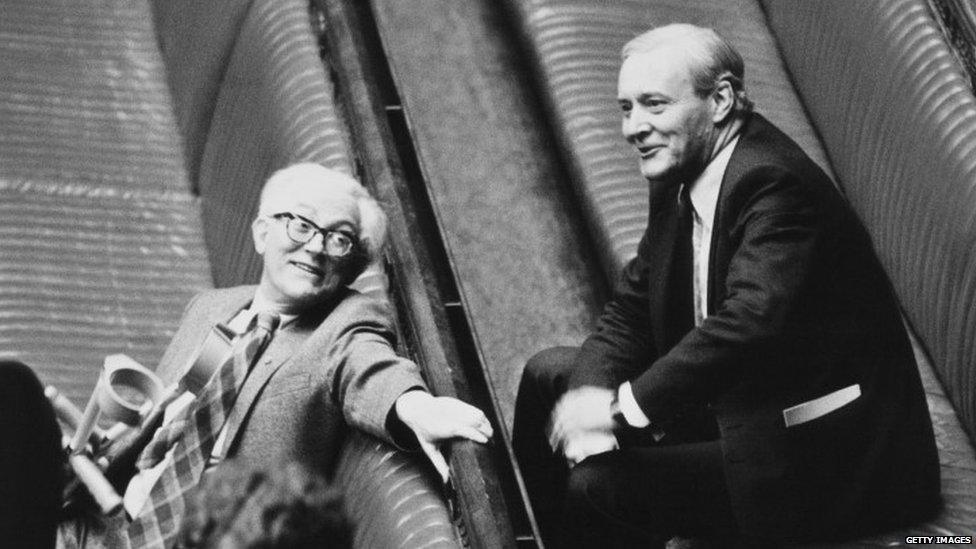
Jeremy Corbyn draws some clear lessons from Michael Foot's defeat in 1983
He told me: "It taught me the formation of the SDP was catastrophic to the election chances of Labour.
'The Conservative so-called triumph in 1983 owed more to the division of the opposition vote than a move to the left."
He certainly didn't share Gerald Kaufman's analysis that the anti-nuclear weapons and anti-EU manifesto was "the longest suicide note in history".
His close political ally Tony Benn hailed Labour's 1983 performance as achieving "eight million votes for socialism".
So - free from the threat of another SDP-style split - it is possible that Jeremy Corbyn will resurrect Labour's defence review and while unilateral disarmament isn't on the agenda at this year's conference it could feature next year.
Labour rules
A review of Labour Party democracy is also promised - and it is possible that Jeremy Corbyn could leave an important legacy for those on the left of the party.
If he reduces MPs' role in nominating the next leader - for example requiring them to have just 5% support before going to a members' ballot - he may feel he has made the leadership safe for a left-wing successor.
He is likely to reject his deputy Tom Watson's suggestion of a "electoral college" giving more say to MPs and the abolition of the cut-price registered supporters' scheme. Many of those supporters backed him.
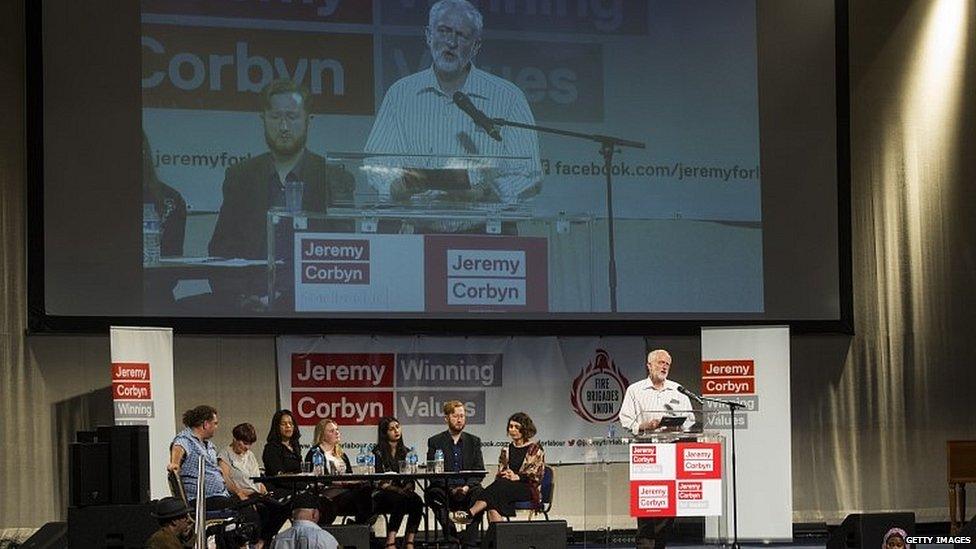
Labour has been pulling in different directions but will it now unite under its leader
And he is almost certainly going to open up more policy proposals to online consultation with the burgeoning membership. But he is likely to receive competing advice over how far and how fast he should change his party.
Even Tony Blair's close friend and former shadow justice secretary Lord Falconer accepts that Labour is now 'an anti-austerity party' and some of Jeremy Corbyn's allies want him to bank this and consolidate.
As one leading supporter said "he was only supposed to blow the doors off".
This week in Liverpool, Momentum are holding their own series of events under the slogan "the world transformed".
Jeremy Corbyn will be urged to continue to transform Labour too from a conventional parliamentary party to a genuine social movement battling for change at Westminster but also beyond it.
It is what the left used to call "extra-parliamentary action" and many in the current generation of Jeremy Corbyn's supporters believe it's an idea whose time has come.